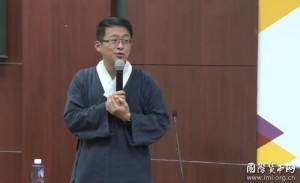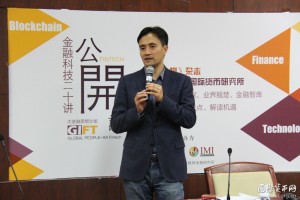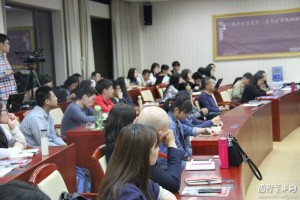Macro-Finance Salon (No. 56) and Fintech Open Classes (No. 3): Financial Technology Promotes Inclusive Finance
2017-04-19 IMI Mr. Ye Daqing first talked about the relation between Fin-Tech and Tech-Fin, and the past and present of financial technology. He believed that essentially, Fin-Tech was to provide financial services through information technology, for example, Fin-Tech could use data and technology to provide risk control services. Then, he talked about the past of financial technology with reference to some well-known financial companies and products throughout history. He also introduced the original form of the classic business model and its evolution in China. He divided China’s financial technology into six models—payment, financial search, crowd-funding, big data finance, P2P lending and Internet insurance, and pointed out that every kind of financial technology had its own unique development strategy. China has a large population and rapid development of mobile Internet. Finance has long been repressed. People’s financial needs are yet to be satisfied, and consumer finance is at its dawn. It is because of these advantages that China's technological innovation has gone beyond the United States.
Mr. Ye Daqing first talked about the relation between Fin-Tech and Tech-Fin, and the past and present of financial technology. He believed that essentially, Fin-Tech was to provide financial services through information technology, for example, Fin-Tech could use data and technology to provide risk control services. Then, he talked about the past of financial technology with reference to some well-known financial companies and products throughout history. He also introduced the original form of the classic business model and its evolution in China. He divided China’s financial technology into six models—payment, financial search, crowd-funding, big data finance, P2P lending and Internet insurance, and pointed out that every kind of financial technology had its own unique development strategy. China has a large population and rapid development of mobile Internet. Finance has long been repressed. People’s financial needs are yet to be satisfied, and consumer finance is at its dawn. It is because of these advantages that China's technological innovation has gone beyond the United States.
 As for the impact of financial technology on the industry, Ye Daqing pointed out that in the wave of financial technology, the most important factor to make customers loyal was the "convenience of access to services". Comparing with that, “financing costs” was becoming less important. Thus, in terms of user experience, traditional financial institutions could not compete with Internet finance companies. In recent years, many traditional bank executives have flocked to the Internet companies, and traditional banks have been losing young customers. He argued that financial institutions that are close to our lives, including retail banking, investment and wealth management, the transfer and payment of funds, were easily subverted by Fin-tech. A prevailing trend is to promote cooperation and integration between finance and technology. The future of financial technology is to be mobile.
As for the impact of financial technology on the industry, Ye Daqing pointed out that in the wave of financial technology, the most important factor to make customers loyal was the "convenience of access to services". Comparing with that, “financing costs” was becoming less important. Thus, in terms of user experience, traditional financial institutions could not compete with Internet finance companies. In recent years, many traditional bank executives have flocked to the Internet companies, and traditional banks have been losing young customers. He argued that financial institutions that are close to our lives, including retail banking, investment and wealth management, the transfer and payment of funds, were easily subverted by Fin-tech. A prevailing trend is to promote cooperation and integration between finance and technology. The future of financial technology is to be mobile.
 As for inclusive finance, Ye Daqing pointed out that financial technology would be helpful to solve the long-existing “80/20 rule”. Compared to the United States’ financial services coverage rate as high as 75.6%, China lags far behind with a coverage rate of 20%. With inclusive finance, we should strive to achieve the “20/80 rule” and solve small financial users’ needs which accounts for 80-90 percent of our population. He stressed that inclusive finance should firstly be “universal” and then “affordable”. Currently, making inclusive finance universal is more important than “providing affordable financing cost”. In addition, through reducing financial service cost including labor costs and construction costs, assisting risk control with big data, expanding the use of financial services through Internet, financial technology could solve the paradox of inclusive finance and resolve the conflicts between financing side’s low cost and investing side’s high return expectation.
As for inclusive finance, Ye Daqing pointed out that financial technology would be helpful to solve the long-existing “80/20 rule”. Compared to the United States’ financial services coverage rate as high as 75.6%, China lags far behind with a coverage rate of 20%. With inclusive finance, we should strive to achieve the “20/80 rule” and solve small financial users’ needs which accounts for 80-90 percent of our population. He stressed that inclusive finance should firstly be “universal” and then “affordable”. Currently, making inclusive finance universal is more important than “providing affordable financing cost”. In addition, through reducing financial service cost including labor costs and construction costs, assisting risk control with big data, expanding the use of financial services through Internet, financial technology could solve the paradox of inclusive finance and resolve the conflicts between financing side’s low cost and investing side’s high return expectation.
